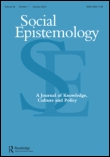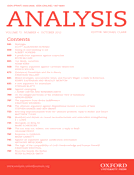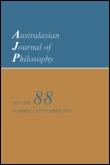
Social Epistemology
Scope & Guideline
Navigating the nuances of epistemology in modern contexts.
Introduction
Aims and Scopes
- Epistemic Injustice:
A core area of focus for the journal is the exploration of various forms of epistemic injustice, including testimonial and hermeneutical injustices, particularly in marginalized communities and contexts where traditional epistemic structures fail. - Interdisciplinary Research:
The journal promotes interdisciplinary approaches that integrate insights from philosophy, social sciences, and humanities to address complex epistemic challenges in contemporary society. - Digital and Social Media Epistemology:
Investigations into how digital platforms and social media influence knowledge production, dissemination, and public trust, particularly in the context of misinformation and disinformation. - Cultural and Historical Contexts:
A significant emphasis on the cultural and historical dimensions of epistemology, examining how different cultural narratives and histories shape knowledge systems and epistemic practices. - Ethics of Knowledge Production:
An ongoing concern with the ethical implications of knowledge production, including discussions around accountability, transparency, and the responsibilities of knowledge producers.
Trending and Emerging
- Participatory Epistemology:
A rising theme is the emphasis on participatory approaches that include voices from marginalized populations in knowledge production, challenging hegemonic narratives and promoting epistemic justice. - Impact of Technology on Knowledge:
Increasing attention is being given to how emerging technologies, including AI and digital platforms, reshape epistemic practices and public trust in knowledge, reflecting concerns over misinformation and epistemic governance. - Intersections of Identity and Knowledge:
There is a growing exploration of how various identities (gender, race, class) intersect with knowledge production and dissemination, particularly in relation to epistemic privilege and injustice. - Critical Examination of Expertise:
The journal is witnessing a surge in critical examinations of expertise, questioning traditional notions of authority and the implications of expert knowledge in democratic processes. - Environmental Epistemology:
Emerging discussions around environmental issues and how epistemic practices influence public understanding and action on climate change and sustainability are becoming more prevalent.
Declining or Waning
- Traditional Epistemology:
There appears to be a waning interest in traditional epistemological debates that do not engage with social contexts or justice, as the journal increasingly prioritizes discussions that intersect with social issues. - Purely Theoretical Constructs:
Papers that focus solely on abstract theoretical constructs without empirical grounding or social relevance are becoming less frequent, suggesting a shift towards more applied epistemic inquiries. - Eurocentric Perspectives:
The journal is moving away from Eurocentric epistemological perspectives, focusing instead on decolonial approaches and the integration of diverse epistemologies from non-Western contexts.
Similar Journals

KNOWLEDGE ORGANIZATION
Transforming Information Landscapes through ScholarshipKNOWLEDGE ORGANIZATION is a prominent journal in the field of Library and Information Sciences, published by NOMOS Verlagsgesellschaft mbH & Co KG. With an impressive impact reflected by its 2023 Q2 category ranking and a Scopus rank of #135 out of 280 in its discipline, this journal serves as a vital platform for disseminating research that advances our understanding of knowledge organization systems and practices. Since its inception in 1993, the journal has provided a convergence of innovative theoretical frameworks and practical applications that address the complexities of organizing knowledge in an ever-evolving information landscape. Although it currently does not offer open access options, KNOWLEDGE ORGANIZATION continues to be essential for researchers, practitioners, and students eager to explore critical methodologies and emerging trends within the field. For those interested in contributing to or gaining insight from high-quality research relevant to library and information sciences, this journal remains an invaluable resource.

MINERVA
Catalyzing Critical Thought in Contemporary IssuesMINERVA is a prestigious academic journal published by Springer, renowned for its vital contributions to the fields of Education and Social Sciences. Established in 1962 and continuing its publication until 2024, MINERVA has established itself as a significant platform for scholarly discourse, offering high-quality, peer-reviewed articles that delve into contemporary issues and research in these disciplines. With an impressive impact factor and ranked within the Q1 category in both education and miscellaneous social sciences as of 2023, the journal stands out in the academic community, appealing to researchers, practitioners, and students alike. Since adopting an Open Access model in 2017, MINERVA enhances accessibility to its important findings, furthering academic engagement and collaboration. Its scholarly rigor is evident, as reflected in its rankings, including #52/604 in miscellaneous social sciences and #36/275 in general social sciences on Scopus. This journal is not only a repository of knowledge but also a catalyst for innovation and critical thought in today’s rapidly evolving educational and social landscapes.

Global Knowledge Memory and Communication
Innovating Connections in Global Knowledge ManagementGlobal Knowledge Memory and Communication, published by EMERALD GROUP PUBLISHING LTD, is a leading journal in the field of Library and Information Sciences, with an impressive 2023 Q2 ranking in its category. With an ISSN of 2514-9342 and an E-ISSN of 2514-9350, this journal has been at the forefront of research since its inception in 2018 and is expected to run until 2024, showcasing significant contributions to the nexus of knowledge management and communication practices. Based in the United Kingdom, the journal's editorial scope encompasses diverse perspectives on how knowledge is created, shared, and retained in an increasingly digital world, making it a vital resource for researchers, academics, and practitioners in the social sciences. Furthermore, with its current Scopus ranking of #58 out of 280 in the library and information sciences category, which positions it in the top 79th percentile, the journal engages a global audience committed to advancing knowledge across disciplines. Though it is not an open-access journal, its rich and diverse content ensures it remains accessible to a wide readership, enabling meaningful discourse and innovation in the field.

Axiomathes
Fostering Innovative Discourse in Interdisciplinary ResearchAxiomathes is a distinguished interdisciplinary journal that rigorously explores the intersections of Mathematics and Philosophy, offering a unique platform for innovative research and discourse since its inception in 1993. Published by Springer, this journal is based in the Netherlands and has garnered a significant reputation in the academic community, as evidenced by its 2023 Scopus rankings, where it stands at Rank #198/806 in Philosophy and Rank #51/90 in Mathematics (miscellaneous). With a focus on advancing theoretical frameworks and fostering critical discussions, Axiomathes aims to bridge the gap between mathematical theories and philosophical implications, making it an essential resource for researchers, professionals, and students alike. The journal is available in both print and open access formats, ensuring broad accessibility and engagement with its content. By continually adapting to the evolving landscapes of these disciplines, Axiomathes remains a vital contributor to academic discourse and knowledge dissemination in the fields of Mathematics and Philosophy.

Epistemology & Philosophy of Science-Epistemologiya i Filosofiya Nauki
Exploring the Intersections of Philosophy and ScienceEpistemology & Philosophy of Science-Epistemologiya i Filosofiya Nauki is a prestigious journal published by the Russian Academy of Sciences - Institute of Philosophy, dedicated to advancing the discourse in the fields of epistemology, philosophy of science, and related disciplines. With a distinguished presence in academia, this journal is recognized for its exceptional contributions, evident through its categorization as a Q2 journal in Arts and Humanities and Philosophy, and a Q1 journal in Cultural Studies. Covering an expansive scope from 2017 to 2023, it facilitates a vital dialogue among scholars and professionals aiming to explore the intersections of knowledge, culture, and education. Although currently not open access, the rigorous peer-review process ensures that only high-quality research is published, enriching the intellectual landscape. The journal's commendable rankings in Scopus, particularly in Arts and Humanities and History and Philosophy of Science, reflect its commitment to scholarly excellence. For researchers, educators, and students, Epistemology & Philosophy of Science serves as an essential resource for understanding and contributing to the ongoing philosophical dialogues that shape our comprehension of scientific inquiry.

PHILOSOPHIA
Igniting Critical Discourse in PhilosophyPHILOSOPHIA is an esteemed academic journal published by Springer, focusing on the diverse field of philosophy. With an ISSN of 0048-3893 and E-ISSN 1574-9274, this journal serves as a prestigious platform for innovative philosophical discourse and research. Based in the Netherlands at VAN GODEWIJCKSTRAAT 30, 3311 GZ DORDRECHT, PHILOSOPHIA has garnered a reputation for its high-quality contributions, maintaining a Q1 classification in Philosophy and ranking 229 out of 806 in the Scopus Arts and Humanities category, placing it within the top 71st percentile. The journal's scope spans critical analyses and contemporary debates, making it an essential resource for philosophers, scholars, and students seeking to engage with cutting-edge ideas. Although it does not currently offer open access, its rigorous review process and academic integrity ensure that published articles are of the highest scholarly standard. With its convergence of contributions since 1971 and ongoing commitment to advancing philosophical inquiry, PHILOSOPHIA remains pivotal in shaping both theoretical and practical understandings within the discipline.

Information Communication & Society
Illuminating Contemporary Issues in Digital CommunicationInformation Communication & Society, published by Routledge Journals, Taylor & Francis Ltd, is a premier journal in the fields of communication and library and information sciences, boasting an impressive impact factor and consistently high rankings in Scopus, including Rank #18/511 in Communication and Rank #14/280 in Library and Information Sciences for 2023. With its focus on the dynamic interplay between information technology and society, the journal serves as a vital platform for researchers, professionals, and students, facilitating the discussion of contemporary issues that shape digital environments. Since its inception in 2001 and converging from 2005 to 2024, the journal has maintained a rigorous peer-review process to ensure that it publishes high-quality research that contributes to ongoing debates and developments in the digital age. Although it does not offer open access, the journal's esteemed reputation and Q1 categorization underscore its impact within the academic community, making it an essential resource for anyone interested in the evolution of communication in the modern world.

ANALYSIS
Exploring the Depths of Philosophical InquiryANALYSIS, an esteemed journal published by Oxford University Press, ranks in the top quartile (Q1) within the field of Philosophy, showcasing its significance in disseminating cutting-edge research and critical studies since its inception in 1933. With an ISSN of 0003-2638 and an E-ISSN of 1467-8284, the journal has maintained a dedicated readership across various converged publications from 1933 to the present. Based in the United Kingdom, ANALYSIS is committed to exploring foundational philosophical questions and advancing theoretical dialogue in both traditional and contemporary contexts. The journal is recognized for its rigorous peer-review process and is indexed in Scopus, reflecting its solid standing at rank #178/806 in the Arts and Humanities domain, encompassing the 77th percentile of its category. Although currently not available as an open-access journal, ANALYSIS provides invaluable insights and a platform for philosophical discourse that appeals to scholars, professionals, and students alike, fostering a deeper understanding of the complexities in the world of philosophy.

Topicos-Revista de Filosofia
Connecting Minds Through Open Access Philosophical ScholarshipTopicos-Revista de Filosofia, published by UNIV PANAMERICANA, DEPT FILOSOFIA, stands as a significant academic platform within the field of philosophy, actively contributing to scholarly discourse since 2006 through its open access model. With an ISSN of 0188-6649 and an E-ISSN of 2007-8498, this journal is dedicated to fostering critical thought and philosophical inquiry in both regional and global contexts. Operating out of Mexico City, it provides a vital avenue for researchers, professionals, and students to engage with contemporary philosophical issues, reflected in its ranking of Q3 in the 2023 category for Philosophy and its position within the 33rd percentile among over 800 peer journals in the field according to Scopus. Topicos not only prioritizes accessibility to philosophical scholarship but also aims to propel academic discussions and elevate the standards of philosophical research. With coverage extending from 2013 to 2024, it invites contributions that bridge diverse philosophical traditions and innovative thought pathways, reinforcing its role as an influential resource for the philosophical community.

AUSTRALASIAN JOURNAL OF PHILOSOPHY
Championing Scholarly Excellence in PhilosophyAustralasian Journal of Philosophy, published by Routledge Journals, Taylor & Francis Ltd, serves as a premier platform for scholarly discourse in the field of Philosophy. With its origins dating back to 1947, this esteemed journal maintains a rich tradition of fostering high-quality, peer-reviewed research and is recognized for its significant contribution to the philosophy community. Holding a distinguished Q1 ranking in the field for 2023 and standing at #75 out of 806 in the Scopus Arts and Humanities ranking, it occupies a vital niche in advancing philosophical knowledge and inquiry. Although the journal is not open access, it periodically offers articles that contribute to the dissemination of philosophical thought, making it a valuable resource for researchers, professionals, and students alike. The AUSTRALASIAN JOURNAL OF PHILOSOPHY continues to inspire and challenge thinkers worldwide as it presents critical analyses, innovative ideas, and rigorous arguments, ensuring its relevance and importance in contemporary philosophical discussions.